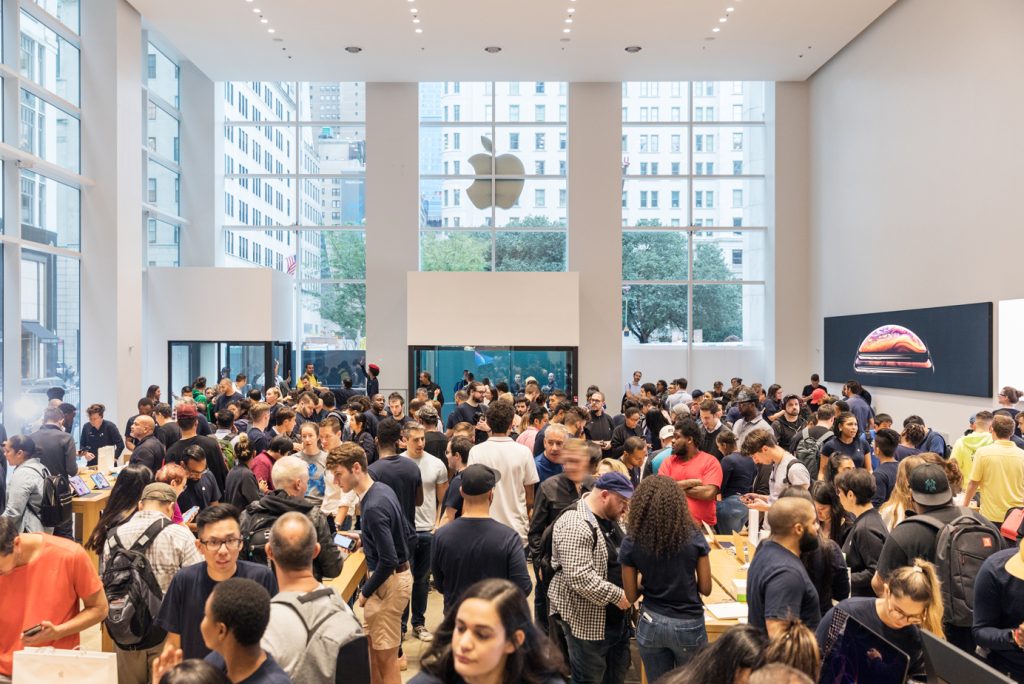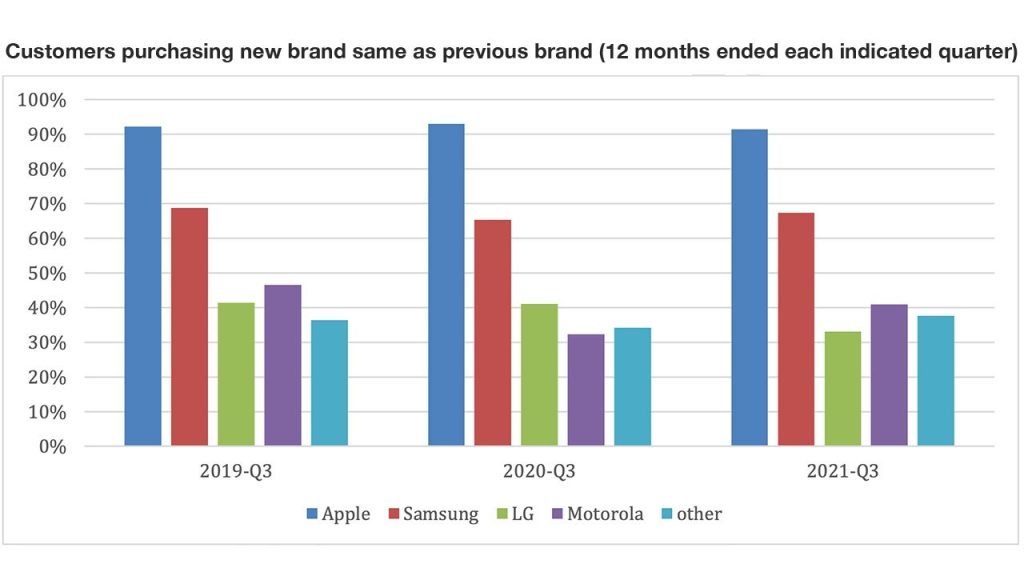
Founded on 1 April 1976 by Steve Jobs, Steve Wozniak, and Ronald Wayne in California, Apple Inc., originally known as Apple Computer Inc., has become the leader in the electronics market.
Initially selling simple computers, the company achieved unprecedented success with popular products such as the iMac (1998), iPod (2001), iPhone (2007) and iPad (2010).1
Today, the brand has such a massive following that it’s often referred to as the “Apple Phenomenon”. For instance, an increasing number of people opt for Apple products, some even queuing for hours just to get their hands on the latest product releases.
But what makes Apple so incredibly popular?
Brand Values
A significant factor behind Apple’s remarkable success is its commitment to innovation. This dedication to modernising the tech industry was evident right from the beginning, as shown in the iconic 1984 Macintosh Commercial directed by Ridley Scott. In this spot, Apple didn’t simply present a new computer; it announced a revolution.
The commercial shows an Orwellian world where oppressed and conformist men obediently listen to Big Brother. Allegorically represented by an athletic woman, the new Apple Macintosh computer destroys Big Brother and emancipates men, providing them with individuality and freedom.
On January 24th, Apple will introduce Macintosh. And you’ll see why 1984 won’t be like “1984.”
Steve Jobs
By alluding to Orwell’s masterpiece, the commercial’s final and core message didn’t merely focus on the product itself but on the values it embodied. For the first time, innovation wasn’t limited to the devices; it represented new ways of thinking and interpreting the world. Macintosh emerged as the symbol of imminent change, freedom, and transformation.
Consumer Image
From the beginning, Apple has also consistently delineated the values embodied by its consumers. In various public speeches and advertising campaigns, such as “Think Different”, Steve Jobs focused on defining who Apple people are, often leaving out product descriptions.
You still have to think differently to buy an Apple computer… The people who buy them do think different. They are the creative spirits in this world, and they’re out to change the world. We make tools for those kinds of people.
Steve Jobs
Apple consumers are seen as the nonconformist representation and manifestation of exclusivity, creativity, and influence. These ideals have then integrated the concept of coolness, elevating Apple products to absolute status symbols.
Product Design
Creativity and innovation are also evident in Apple’s product design. As explained in the article “Analysis Of Apple Equipment In The Product Design Thinking”, the company prioritises design over manufacturing and focuses on creating products that are both technologically advanced and aesthetically pleasing.2 The success of Apple’s product design is notably attributed to Steve Jobs’ pursuit of perfection, ambition, and creativity.
I think if you do something and it turns out pretty good, then you should go do something else wonderful, not dwell on it for too long. Just figure out what’s next.
Steve Jobs
Technological innovation is also an aspect that has impacted Apple’s design influence. For instance, Apple has set the standard for the design of many devices. Features like Face ID, now found in almost every smartphone, were designed and developed by Apple. Because Apple’s product design embodies creativity and innovation, it also reflects the humanistic values that the company has spread since its beginning. Therefore, “Apple’s design culture is a perfect mix of people with technology, with environment, with the product.”3
Community Loyalty
A direct result of the brand’s solid personality and innovative spirit is community loyalty. Research, such as “The Church of Mac: Exploratory Examination on the Loyalty of Apple Customers”, analyses the strong reputation of Apple’s brand and its customer loyalty.4 This concept finds further support in a 2021 report from the Consumer Intelligence Research Partners (CIRP), which revealed an iPhone user loyalty rate of over 90% between 2019 and 2021.

Strong customer loyalty is essential for the brand’s success, as it maintains existing followers while attracting new buyers. As a matter of fact, since the 1990s, Apple enthusiasts have actively participated in what Pogačnik and Črnič describe as “Apple Evangelism”, introducing people to this ideology by recommending they use Mac products.5
Conclusion
In conclusion, Apple’s success can be attributed to its commitment to creativity, consumer image, innovative product design, and the community loyalty it has established. It’s evident that Apple represents more than just a brand; it embodies a set of values that people continue to choose every day.
References
- Pogačnik, Anja & Črnič, Aleš. (2014). “iReligion: Religious Elements of the Apple Phenomenon”. Journal of Religion and Popular Culture. 26. 353-364. DOI: 10.3138/jrpc.26.3.353. https://utpjournals.press/doi/pdf/10.3138/jrpc.26.3.353 ↩︎
- Yan, Jun (2016). Analysis of Apple Equipment in the Product Design Thinking. Proceedings of the 2016 International Conference on Advances in Management, Arts, and Humanities Science. Atlantis Press. 12. 228-231. DOI: 10.2991/amahs-16.2016.47. https://www.atlantis-press.com/proceedings/amahs-16/25865806 ↩︎
- Ivi, p. 229.
↩︎ - Pinson, Caroline & Brosdahl, Deborah J. C. (2014). “The Church of Mac: exploratory examination on the loyalty of Apple customers”. Journal of Management and Marketing Research. https://www.aabri.com/manuscripts/131651.pdf ↩︎
- Pogačnik, Anja & Črnič, Aleš. “iReligion: Religious Elements of the Apple Phenomenon”. 357. ↩︎



Brand loyalty is indeed a strong and long-lasting bond that people create with a specific brand. In my opinion, it is more than just recurrent purchases; it is an emotional and psychological attachment to a brand founded on great experiences and shared values.
As an Apple hater, this is something I too must give them credit for. I primarily don’t like them because of their anit-right-to-repair activities, but there are many others who do not seem to care. They have an insanely devoted customer base; to a degree that for some folks it is almost cult-like. In that light I had quite a chuckle over that 1984 ad. Apple has a very simple motto: if it works it works, and we wont make it more complicated. That is certainly a part of their success.